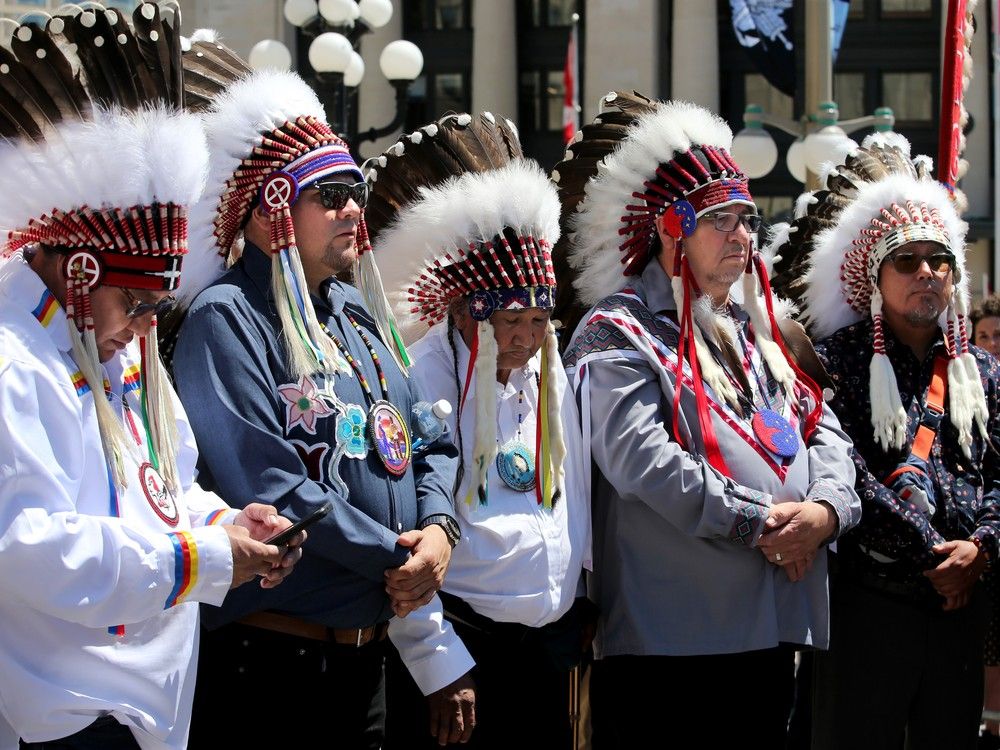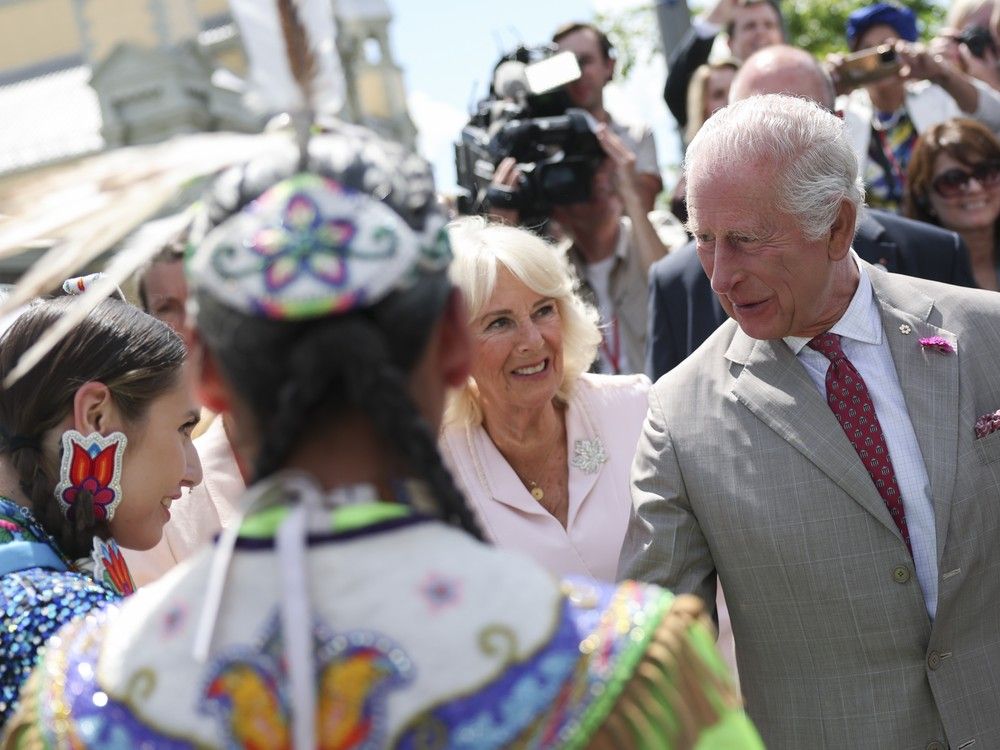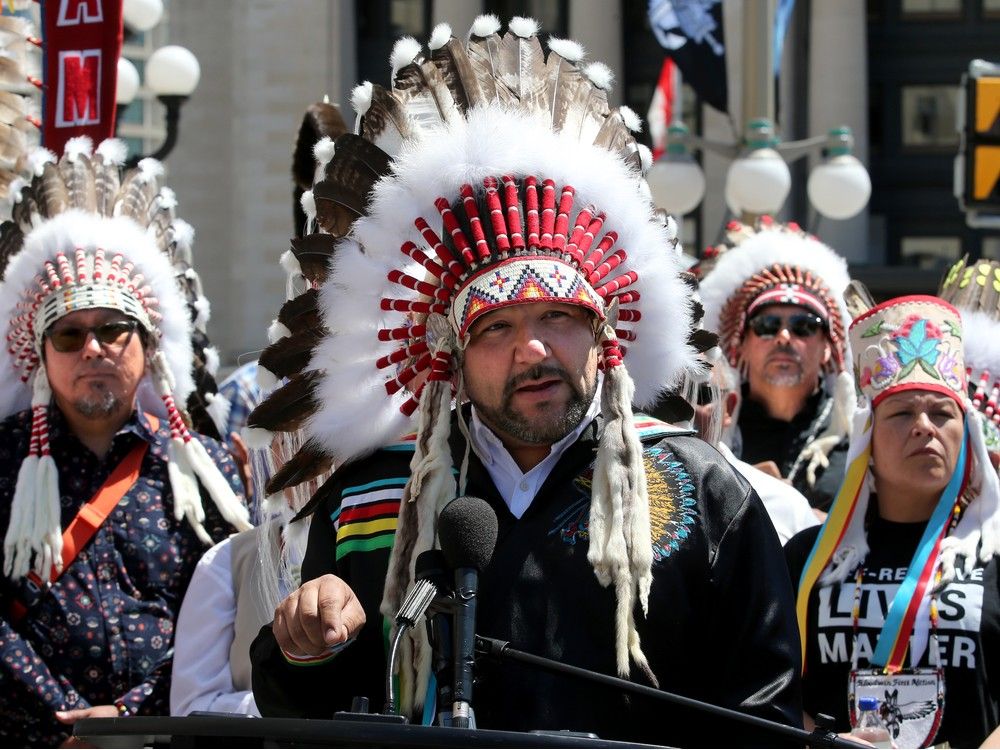Over the whirlwind
24-hour royal visit
, Indigenous leaders and elders from across Canada traveled to Ottawa to bring a clear message to the federal government: do not forget your treaty obligations.
As King Charles III stepped off his plane and onto the tarmac at Ottawa International Airport on the afternoon of May 26, Jackie Cote and her brother, Eddie, were there to meet him. Cote is a residential school survivor from Kitigan Zibi.
They both wore orange sweaters emblazoned with “Every Child Matters” and sat behind a Kitigan Zibi youth drum group who played for the king as he arrived.
“I wanted to give him a message that he’s on Algonquin territory,” Cote said.
Algonquin nations, unlike other First Nations in Canada, do not have a treaty with the federal government, which is the reason for the term unceded. For Cote, it’s important that the relationship is defined by recognition of history and land, particularly Algonquin land that Parliament Hill sits on.
But for First Nations who have signed treaties, which are living agreements between the Crown and First Nations around rights and title of the land, the king’s visit served as an opportunity to convey that those agreements carry weight and obligation.

Willie Littlechild, a residential school survivor and commissioner for the
Truth and Reconciliation Commission
, met the King after a tree planting ceremony at Rideau Hall later that day.
For him the spirit of treaty, what he calls a “sacred agreement,” was symbolized by a visit of the Crown to Canada.
“We offer to share our resources, our lands, our territories, and in return, we have benefits, yes, but it goes both ways — it’s a working relationship,” he said.
During the Speech to the Throne on May 27, King Charles III spoke about the importance of Canada’s commitment to reconciliation. Part of that commitment included a doubling of the Indigenous Loan Guarantee Program from $5 billion to $10 billion.
In a separate part of the speech, the king also announced that the federal government would reduce the approval of major projects from five years to two.
The fast-tracking of major projects from the federal government follows similar policies adopted by provinces such as
Ontario
and
British Columbia
, which have caused uproar from chiefs in those provinces.
Chief Billy Joel Tuccaro, of Mikisew Cree First Nation in Northern Alberta, was alarmed about what he heard in the speech. He said it’s been a rocky relationship with the Crown since his nation signed Treaty 8 in 1899.
The fast-tracking of projects is another example of “lip service” to the treaty, he told the Ottawa Citizen.
Tuccaro’s First Nation sits downstream from the Alberta oil sands. In a press conference in Ottawa alongside chiefs from across the western provinces on May 27, Tuccaro said that his community has suffered through high cancer rates due to pollution coming from the oil sands.
Last year, the federal government announced a $12-million health study into the accumulation of toxins in the region, something the local community has been requesting for years, Tuccaro said.
“I can say this among the chiefs we all have different agendas, but one thing we have in common is the treaty, and we must fight for that for the future generations to come,” he said at the press conference.
Tuccaro also spoke about his work fighting Alberta separatism, which he said poses a risk to the treaty relationship between First Nations and Canada.

“They tried this in Quebec and it was the First Nations people that squashed this, and once again, it will be the First Nations people [that] squash this separatist movement,” he said.
Chief David Monias, of
Pimicikamak Okimawin
in Manitoba, who visited Ottawa during wildfire evacuations in his home community, spoke about the importance of including First Nations in decision making and resource development.
“We were sovereign. We still are sovereign. And you have to respect that we enter these treaties to make sure that we share land, we share resources, and therefore Canada, who’s the colonial state, must share revenue as well,” he said.
It’s why Monias is calling for the continued fight for Indigenous rights and entitlements. It’s a point Littlechild sees as emblematic with the royal visit.
“This occasion, I think, gives us an opportunity to rebuild our treaty relationships,” Littlechild said. “Sometimes they’ve been broken, sometimes they’ve been harmed, but these opportunities like this are for mending the relationships.”
Related
- King Charles and Queen Camilla wrap up 2-day visit to Ottawa
- Exuberant crowds greet King Charles at Lansdowne and Rideau Hall



